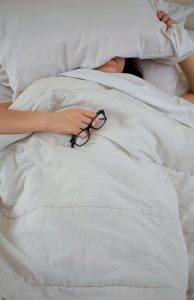 Do you party all night until the sun rises, then wonder why you can’t lose weight? Maybe you’re burning the candle at both ends because of a busy home and/or work life. Either way, weight loss is tougher the less sleep you get and scientists have found part of the reason for that. There’s a direct link between the amount of time you sleep and being overweight.
Do you party all night until the sun rises, then wonder why you can’t lose weight? Maybe you’re burning the candle at both ends because of a busy home and/or work life. Either way, weight loss is tougher the less sleep you get and scientists have found part of the reason for that. There’s a direct link between the amount of time you sleep and being overweight.
You still burn calories when you sleep.
People burn an average of 50 calories per hour when they sleep, but age, sex, race, physical activity level, diet, diseases, and genetics play a role. Someone who is more muscular will have a higher BMR—basil metabolic rate. That’s because muscle requires more calories for maintenance than fat tissue does. Different stages of sleep burn different amounts of calories. There are four stages of sleep, with the first called REM—rapid eye movement—sleep. The other three are NREM—non-rapid eye movement. Your brain and body require more calories during REM sleep.
Too little sleep can cause a hormonal imbalance.
Have you ever noticed how hungry you are when you haven’t had enough sleep? Part of that hunger may come from a desire to increase your energy to compensate for the lack of sleep. The biggest cause of hunger is an imbalance of ghrelin—the hunger hormone—and leptin—the satiety hormone. When you lack sleep, it causes an imbalance in these two hormones. Your body produces more ghrelin and less leptin, so you end up hungrier when you’re awake.
When you get adequate sleep, it boosts your metabolism.
Adequate sleep can boost your energy and keep you moving fast throughout the day. On the opposite end of the spectrum, too little sleep can cause you to drag through the day. You won’t be as likely to move as much when you’re tired. Studies also show the potential for obesity increased by as much as 55% in adults and 89% in children when they lacked sleep.
- You can increase the number of calories you burn when you sleep by eating protein later in the day. Protein takes approximately seven hours to digest and digestion takes extra calories.
- Getting a good night’s sleep is more than just going to bed. You need to turn off all lights, keep the temperature around 66 degrees and turn off all electronic devices like the TV or computer. Studies indicate that a cooler room burns more belly fat.
- Develop a sleep/wake schedule and stick with it even on the weekends. It will help you get a deeper sleep. During deep sleep, you burn more calories.
- The better your sleep is at night, the more energy you’ll have during the day. That extra energy can help you make it through your workout and maybe add a few additional sets to burn extra calories.
For more information, contact us today at Wellness On A Dime Coaching
